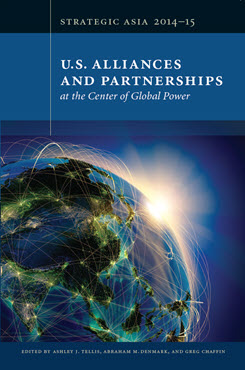Indonesia's Partnership with the United States
Strategic Imperatives Versus Domestic Obstacles
This chapter from Strategic Asia 2014–15 examines both Indonesia’s perception of its strategic environment and the increasing influence of domestic political factors on Indonesian foreign policy and assesses their implications for the U.S.-Indonesia partnership.
EXECUTIVE SUMMARY
This chapter examines both Indonesia’s perception of its strategic environment and the increasing influence of domestic political factors on Indonesian foreign policy and assesses their implications for the U.S.-Indonesia partnership.
MAIN ARGUMENT
Indonesia’s perception of its external security environment has traditionally been fairly benign, enabling Jakarta to promote its interests in a peaceful, autonomous Southeast Asia through diplomatic means, particularly in regional institutions like ASEAN. Recently, Indonesian threat perceptions have been rising as a result of the changing balance of power in the Asia-Pacific and China’s actions in the South China Sea, which threaten Indonesia’s maritime security, its leadership in ASEAN, and its commitment to the peaceful settlement of disputes. A growing convergence of strategic interests dictate strengthening the U.S.-Indonesian partnership. At the same time, the rising influence of nationalism, Islam, and public opinion on Indonesian foreign policy creates obstacles to closer ties with the U.S. With incoming president Joko Widodo likely to adopt a more domestically focused foreign policy, the prospects for strengthening the partnership are unclear.
POLICY IMPLICATIONS
- Although the U.S.-Indonesian partnership has improved dramatically in recent years, whether the partnership continues to strengthen will likely depend on whether strategic or domestic considerations drive Indonesian foreign policy.
- Given domestic pressures on Indonesia’s leadership, if the U.S. takes a more assertive, independent role in regional institutions, it will trigger tensions with Indonesia.
- As a status quo middle power, Indonesia is acutely aware that its interests lie in a stable balance between the U.S. and China. Indonesia’s commitment to an independent policy stance means it will resent any overt attempt by the U.S. to push it into a balancing coalition against China.
Strategic Asia
The Strategic Asia annual edited volume incorporates assessments of economic, political, and military trends and focuses on the strategies that drive policy in the region. Learn more about Strategic Asia.


